Mice are always a potential problem with stored bikes, and this was no exception. A messy nest in the airbox rendered the carburetor set nonfunctional, but lots of TLC and a few replacement parts put us back in business. Turns out the little varmints set up home in the mufflers too. Last week the day finally came to hit the magic button. Here's how it went:
|
Project 20 is a very special 1986 VFR750F. It's special because it's an all-original red/white/blue example with only 5300 miles showing. Owner Rich has generously allowed me to be the one to put it back on the road after a period of inactivity. Like all my projects, this one began with a strip-down and thorough mechanical checks before starting the engine. Mice are always a potential problem with stored bikes, and this was no exception. A messy nest in the airbox rendered the carburetor set nonfunctional, but lots of TLC and a few replacement parts put us back in business. Turns out the little varmints set up home in the mufflers too. Last week the day finally came to hit the magic button. Here's how it went:
0 Comments
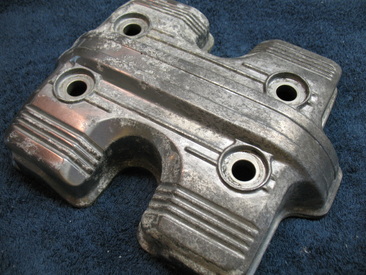 BEFORE... BEFORE... The Magna Project is progressing with the engine mechanical checks complete. Next step is to light the fire and bring this V4 back to life. But, in this case, I took a pause in the action to have the valve covers polished. The reasoning here is that there's so much time and effort involved in removing the covers again at a later date that we decided now was the time. Trouble is, the covers were in such bad condition that my efforts were just not up to the task. Time to bring in the pros. My powder coat shop steered me to a local manufacturer of truck wheel covers, Real Wheels (.com) who had the equipment and expertise to buff through the corrosion and prep these parts properly for a final application of clear powder coat to keep that new-bike luster for years to come. Professionals don't come cheap and the bill for refurbishing these parts was about $180. But what a difference....... 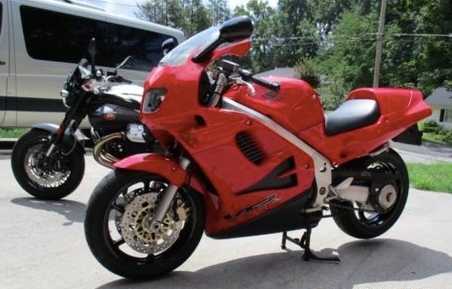 Ebay item number 191963186935 Ebay item number 191963186935 What: 1997 VFR750 Where: Jonesborough, TN Why: Final year, well-kept, low miles Price: Auction, with reserve Showing 11,400 miles, this great-looking final year 750 appears to be a babied example from the perfect seller, judging by what we see in his stable. This bike has newer tires, Shorai battery and a Staintune slip-on that must sound the business. The original parts are included along with manuals and tool kit. This looks like a nice one. No idea of the reserve, but bidding is at $2000 with six days left. As a seller, I would hope to get around $3500. The 1997 model is likely at or very near the bottom of their value swing, so prices should hold and maybe even creep up a bit, especially for a low-mileage, well-owned one like this. Someone will get a great VFR. Update: Reserve not met with bidding up to $2275. 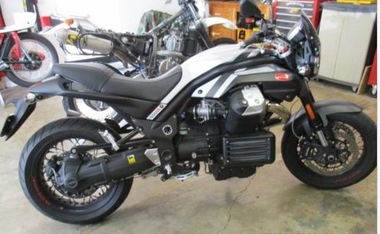 Ebay item number 191963185350 Ebay item number 191963185350 Our seller displays his excellent taste in motorcycles with another eBay offering — this sexy 2013 Moto Guzzi Grisso with only 1200 miles! Always one of my favorite Guzzis, the Grisso is a bad-boy muscle bike with an Italian flair. Tastefully equipped with an Agostini slip-on and fly screen this one-owner would look awesome in my garage. Also includes all the take-offs and a few more extras. The bikes are located in the premium riding country of eastern Tennessee, perfect for a September fly-n-ride. Update: Reserve not met with bidding up to $8100. 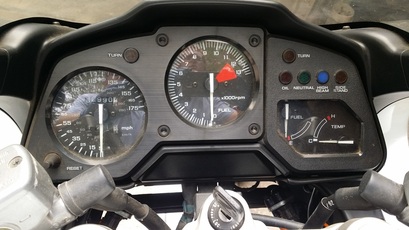 I just heard from interwebs buddy Derek from the Houston area that he has begun work on bringing his newly acquired 1993 VFR750F back to life after few years of inactivity on the part of the previous owner. If there's a collectible third/forth generation VFR this is it. The only year offered in monochromatic white it was a stunner then and still is. What makes Derek's find significant, though, is that it has only 3000 miles(!) and has survived in original condition. He's found some rust inside the fuel tank which is being dealt with and Derek is taking the proper steps to bring the engine back to life. He was an ASE tech back in the day so the bike is in good hands. I hope Derek will keep me posted on his progress. What a find — it proves that they're still out there just waiting to be rescued. 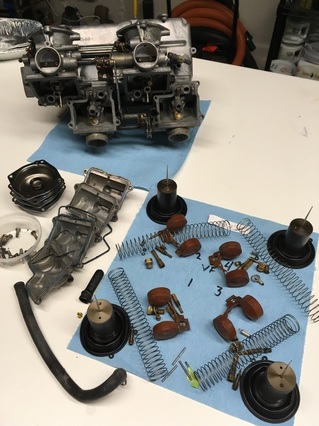 Well, here's something I don't like to find upon disassembling the latest set of carburetors to find its way onto my bench. These are from the Magna Project, and while otherwise pretty clean and in generally good condition, the well-meaning previous fiddler obviously didn't spring for fresh bowl gaskets, instead gooping on way too much RTV in an effort to seal the float bowls. This is a Bad Idea. Those excess globs of RTV can separate and find their way into the carbs, clogging passages which may never clear. It also makes a mess for the next guy to clean up. The VITON bowl gaskets that I supply for the VFR don't fit the earlier VF because the bowls have a deeper groove, preventing the o-ring from making a dependable seal. The solution is an OEM or aftermarket carb rebuild set; about $100 on eBay. Pictured is the set of VF750C carbs disassembled and waiting for their fresh bits and pieces. 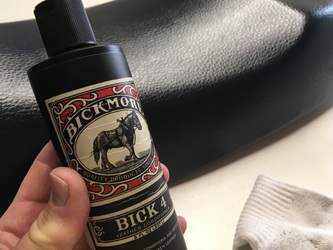 In the world of vintage motos, finding an original 30-year old seat that's in useable condition makes it worth the effort to clean and preserve it. My approach is a deep cleaning with Oxi-Clean in a warm water solution. I scrub it with a soft brush and sponge, taking my time to allow the Oxi to do it's work. After drying overnight, I rub the vinyl with a quality leather conditioner like Bickmore's saddle lotion. The old vinyl is softened and ready for several more year's of service. 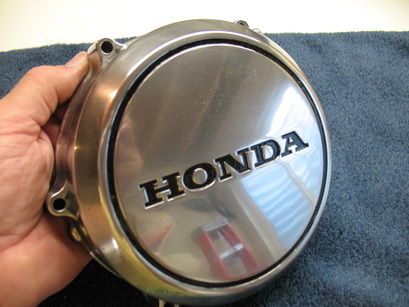 I've recently taken on an '82 Magna 750 project for new friend Charles. He located a 16,000-mile example of the first-year VF750C which he'd like to bring back to life as a weekend rider via a "sympathetic restoration." The Magna series shares it's engine with the first-gen VF700/750 Interceptor but beyond that they're different animals. The mechanical checks are well underway and as part of the valve clearance procedure the alternator cover is removed. Good time to refurbish it. As was common back in the day, these covers were polished aluminum which was clear-coated at the factory. Over the years the clear-coat would deteriorate and corrosion would eat away at the aluminum underneath resulting in a mottled mess of ugly metal. The treatment is to remove the clear paint, sand away the corrosion, file and sand any gouges, scratches or other rash, buff the finish, and finally repaint logos and accents.
This is labor intensive work but time and effort will leave you with a very presentable piece. Machine buffing will give these polished aluminum bits a shine to rival chrome, but the original finish wasn't quite that dramatic. To achieve the right sheen, I wet sand the buffed piece with 2000-grit paper followed by a single hand polish with Mother's aluminum polish. Next up, valve covers. 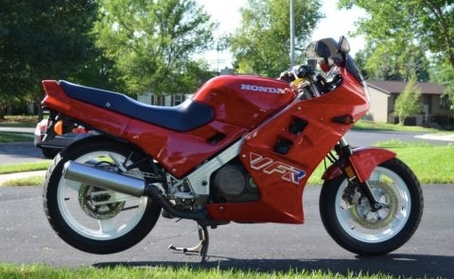 Ebay item number 142086233445 Ebay item number 142086233445 What: 1986 VFR700F Where: Stoughton WI Why: A low-mile salvage bargain? Price: Opening bid $1675, no reserve Once upon a time I was selling a like-new, '05 VFR800 in pearl white. It turned into the most difficult sale I've ever experienced. Why? It had a salvage title. Without a known damage history, salvage or rebuilt vehicles can be a real gamble. Or they can be the buy of the year. Insurance companies use a pretty basic formula to determine whether or not to total a vehicle: cost to repair versus cost to buy out the owner and dispose of the vehicle. Cosmetic damage can be very costly to fix, at least the way insurance companies do it, which is to replace parts with new OEM. I once had an insurance company total a five year-old Ducati ST2 because the fairings got scraped up when pushed over in a parking garage. I could have had the damage repaired for under $1000 but their parts replacement estimate was $6300!
We don't know the history of this repainted '86 Interceptor so no telling if there's hidden issues. The seller states that it was "completely refurbished by an authorized/licensed re-builder a few years ago." Not sure what that means, so I'd want some more details. The alternator cover is not original and the right muffler shows some rash. The bike indicates only 15,200 miles and the red with white wheels looks sharp. So when does buying salvage make sense? Here's my guidelines: 1. When it's the bike you want and will keep it long term. 2. When it checks out mechanically and cosmetically. 3. When it's priced accordingly. 4. And you realize that its value will remain low come time to sell. 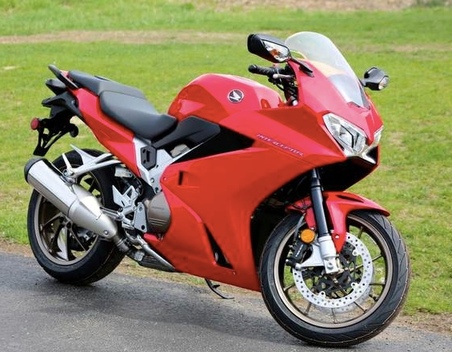 What: 2014 VFR800 (standard) Where: Waukesha, WI (dealer) Why: Super price Price: $6887 Prices continue to fall on leftover eighth-generation Interceptors and here's another example. Offered on Craigslist from Action Powersports in Waukesha, Wisconsin, this 2014 standard model is priced at $6887 from an original MSRP of $12,500. The standard won't have some desirable goodies found on the Deluxe model, like ABS, traction control and heated grips, but this is still a great new motorcycle at a used bike price. http://milwaukee.craigslist.org/mcd/5630511603.html We all know there's good carbs and there's bad carbs. And in the world of vintage motorbikes there's good carbs gone bad, like this set. This is what a few years of hosting mice in your air plenum can produce. First the rodents ate and peed their way through the air filter element and eventually through the metal screening, which allowed the little beasts entry into the four condos of the plenum itself. This is the result. 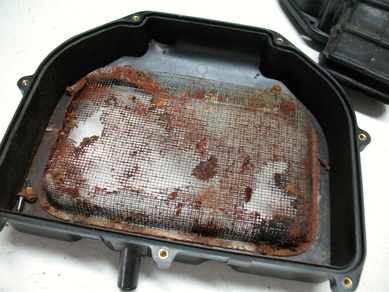 This lower air box is bound for the dumpster. But this isn't the worst of it. These creatures urinate where they live, and gravity moves the toxic mess downward into the carbs, freezing the butterfly valves and sticking the plastic slides in place. This carb set is currently enjoying a long soak in a tub of PineSol, followed by a bath in the ultrasonic cleaner. 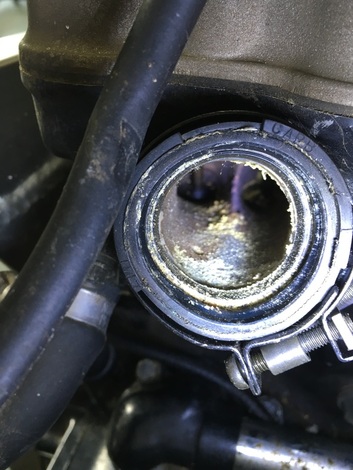 The crud even found its way into the intake runners. This quickly dissolved with a spray of PB Blaster. 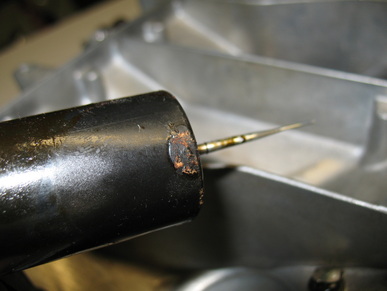 And here's an example of what alcohol-laced fuel can do when left to marinate inside our carbs. This photo shows hardened varnish deposits on the plastic slide and jet needle. 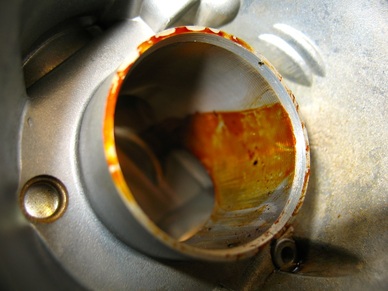 And here's a shot of the slide's bore. These slides were all but glued in place. Too often, issues like these are the beginning of the end for otherwise healthy bikes. The low-speed jets get gummed up, the bike runs worse and worse, gets ridden less and less, and ends up parked in the corner of the garage behind that '84 Camaro project that you're never going to get to. What can we do?
- Recycle fuel by riding our bikes regularly! - If you can't keep fresh fuel in your system, then be sure there's a fuel stabilizer added at all times, like Sta-Bil or my favorite, Star Tron (stupid name, good product). - Drain your carb bowls when stored. - Keep your fuel tank full when stored. - Ride your bike! (did I already list that?) |
THE SHOP BLOG
|
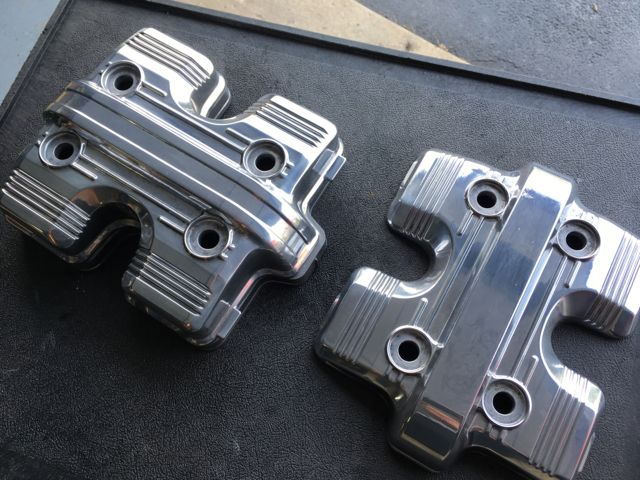
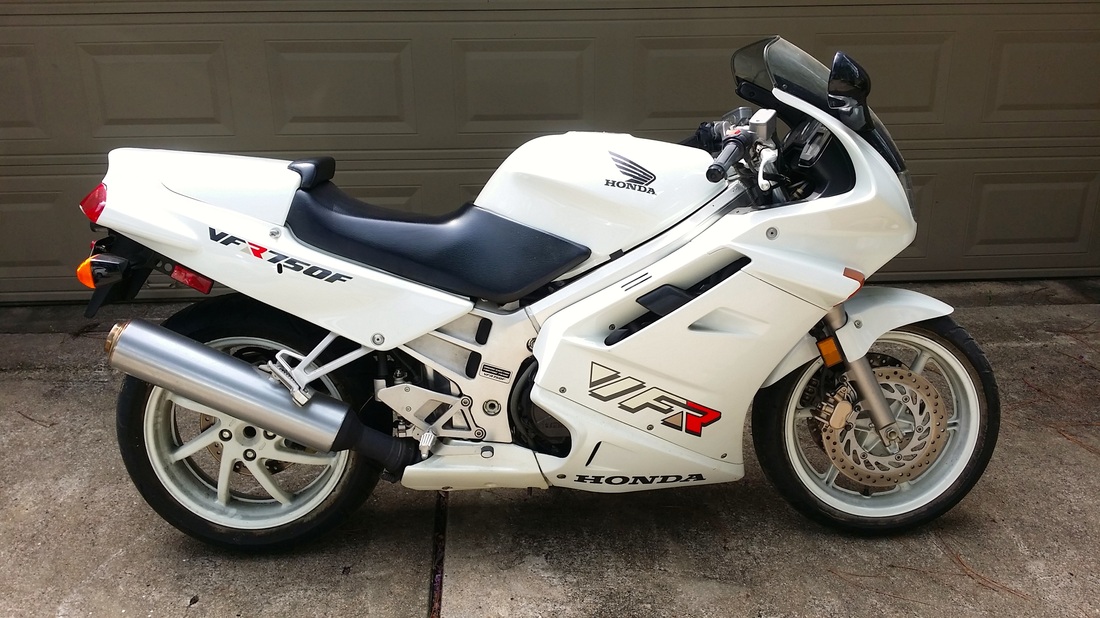
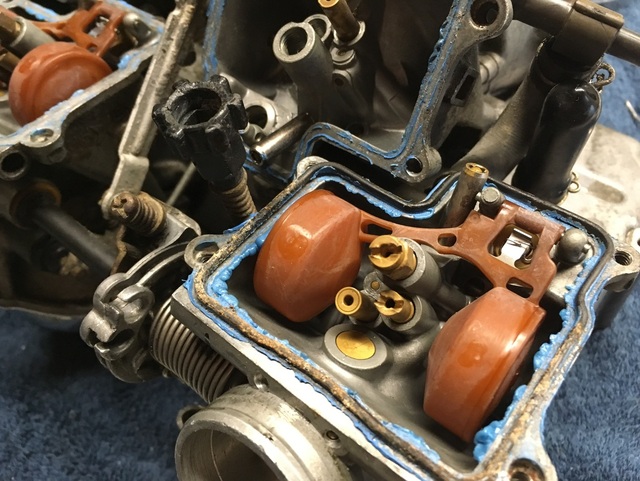



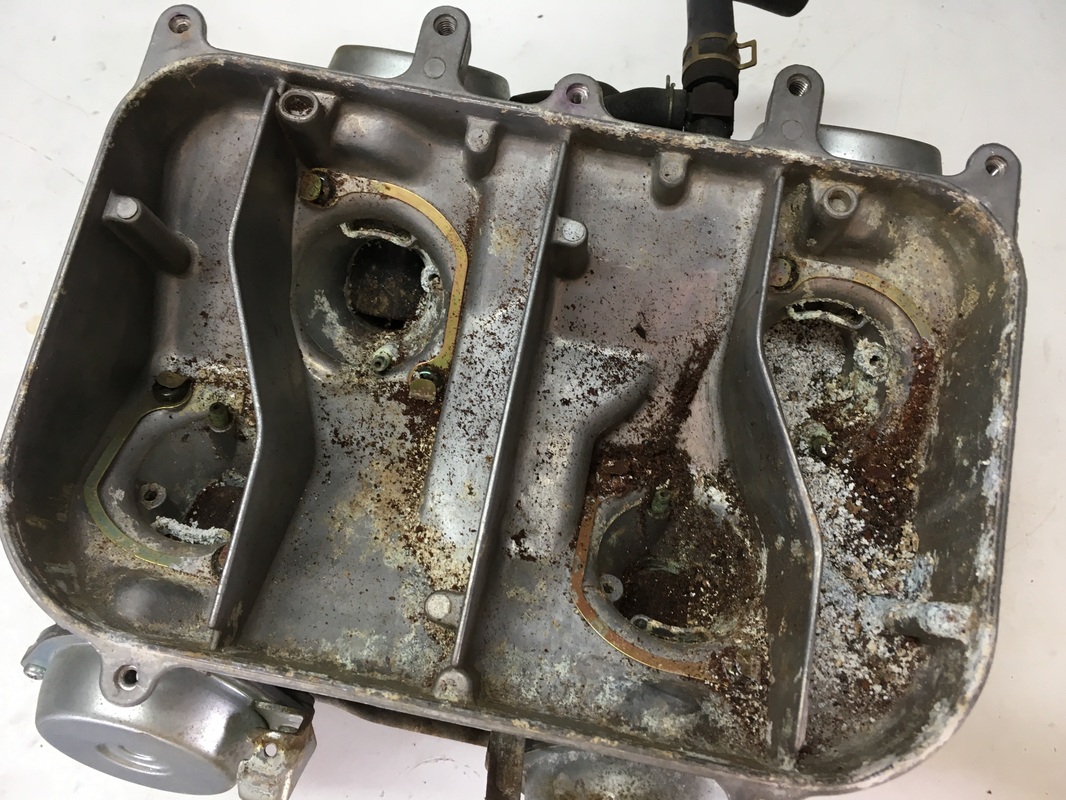
 RSS Feed
RSS Feed